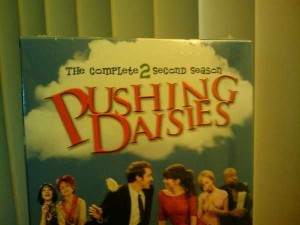There’s a TV on the wall of the crepe cafe where I’m having lunch, bigger than the TV I have at home. Right now it’s showing a live view of the kitchen. This might be more interesting if the kitchen weren’t open to the dining area. I can see the same thing (from another angle) just by turning my head.
Tag: TV
Flash Forward Premiere was Awesome!
The first episode of Flash Forward is one of the best-constructed pilot episodes I’ve seen in a long time, especially of an arc-driven series. (I’ve been trying to think of the last show I saw where I didn’t feel like it took the cast or story a few episodes to get up to speed, and all I can come up with is Firefly.) In one hour, it managed to introduce a slew of characters, show the major world-changing event that sets the arc in motion, pose serious questions (both story-wise and philosophically), force characters to change, set up conflicting agendas and points of view, establish a mystery or two, and find a thematic conclusion to the episode that doesn’t feel like it’s just the first hour of a two- or three-hour show.
Most shows would take two hours to do all that, or pick and choose to cram it into one. (They even found time for a car chase.)
One of the things that really impressed me was that, just using one episode’s worth of characters, they showed the beginnings of so many totally different ways of looking at humanity’s glimpse of the future, whether through hope, fear, or simply confusion. From what they said at Comic-Con, one of the ideas is to be able to expand this to theoretically anyone in the world.
The extended preview of upcoming episodes (a flash forward to Flashforward!) seemed to be making a great effort to say that yes, they’ll be answering questions, and no, you won’t have to wait 3 years to find out what the heck is going on (unlike that other show with Sonya Walger, Dominic Monaghan, and Oceanic Airlines).
There were a couple of moments that I thought were forced, though the only one that really stands out was the immediate juxtaposition of the “we’re being punished” and “this is a gift” reactions.
Adaptation
They did a good job of taking the source material, Robert J. Sawyer’s novel Flashforward (I’m getting really confused as to whether the TV series has a space in the title or not, but the book definitely doesn’t), and making something that’s recognizably the same idea, but telling a new story with it. It has the benefit of all the thought he put into it:
- What are all the consequences of everyone blacking out for two minutes?
- If everyone experiences his or her own future at the same instant, what about people who are asleep at that time?
- How do you determine whether people are seeing different possible futures or the same future?
- How do you determine whether the future can be changed? (It’s a common enough storytelling trope, but how would you scientifically prove it?)
And so on. But they can tell a larger story, with more characters…and still surprise people who read the book. I don’t know whether they plan on using a similar explanation for what caused the event, or whether the TV version will come down on the side of “The future is not set” or “You can’t fight fate” (though I expect it will be the former, for storytelling reasons). And there was a moment a few minutes before the end that just came out of nowhere and left me thinking, “Wait, what???”
The book is definitely worth reading, especially if you like science fiction of the “what would happen if…?” variety, and it looks like it probably won’t spoil much.
Bosley, John Bosley
I’ve just started re-reading Neverwhere. When Richard and Door first meet — after her injury has started to heal, anyway — he introduces himself as “Richard. Richard Mayhew. Dick,” A page or two later, Door calls him “Richardrichardmayhewdick.”
IIRC Neil Gaiman said he stole the joke from Douglas Adams, who had someone refer to “Dentarthurdent” in one of the Hitchhiker’s Guide to the Galaxy books, but I always think of a Charlie’s Angels episode in which someone greeted “Bosleyjohnbosley.”
The thing is, I barely remember Charlie’s Angels, so the way I remember it is actually as “Bosleytombosley” … and in my memory, she’s saying it to Tom Bosley!
Too Short a Season

Pushing Daisies: “The Complete 2 Second Season.” I know it was short, but I’d swear it was longer than that!
Immortal 3G
Hah! “the only advantage of living forever is having the time to read all of TV Tropes.”
T-Mobile’s really expanding 3G lately. We’ve had it for a while, but can’t get a good signal at home. I think the building is a Faraday cage.